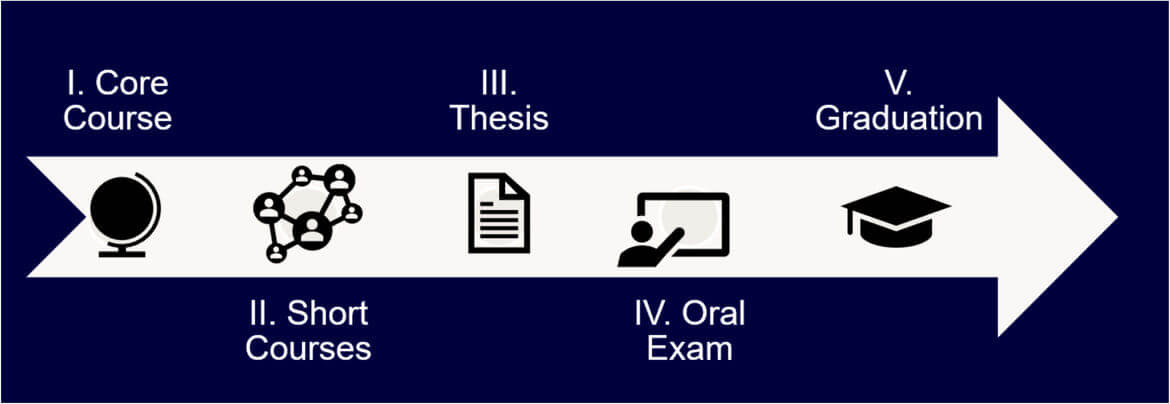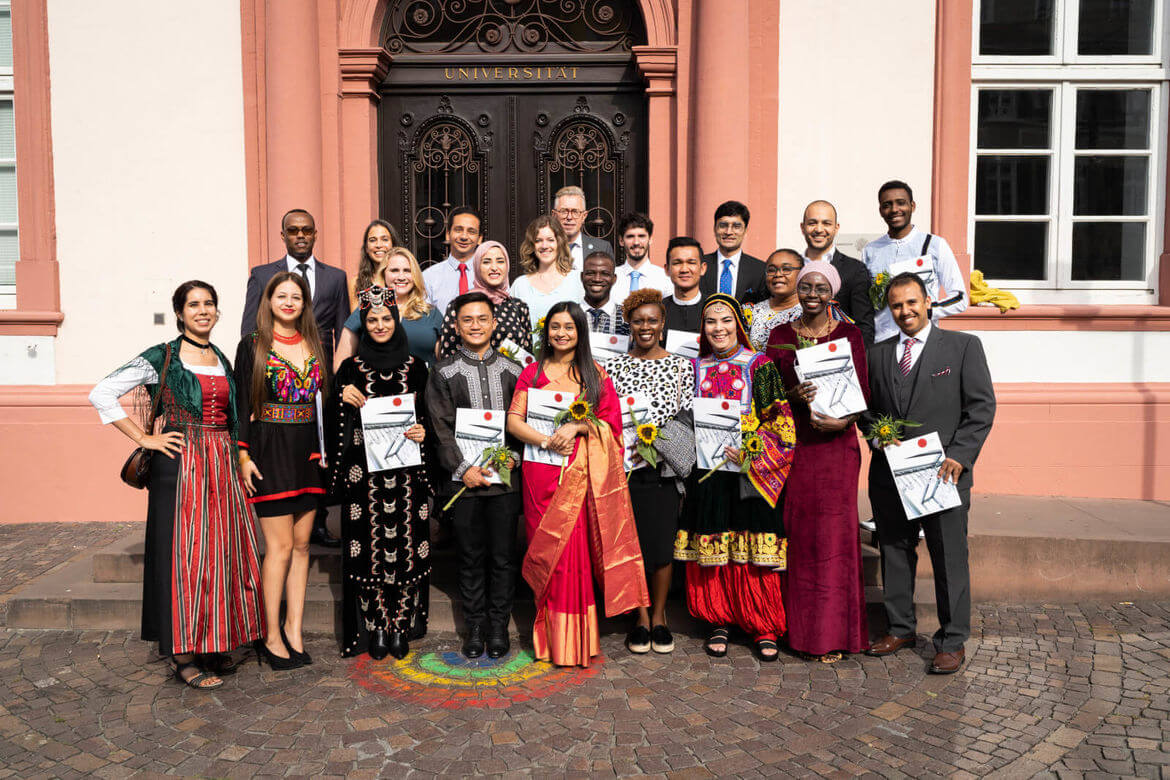Programme Structure
The Master of Science in International Health (MScIH) is a modular programme, allowing for full-time (1 year) and part-time (up to 5 years) study. Before commencing the programme applicants should decide which mode of delivery they want to follow. Both study options lead to the same degree, but differ in terms of time and flexibility.

I. Core Course (20 ECTS)
The core course has a strong methodological focus and provides students with a solid foundation in International Health. It consists of six units of study. Each unit focuses on a specific topic in the context of International Health, e.g. health problems and their determinants, research methods, and health policy and management. The core course runs over a period of 14 weeks from September to December every year and accounts for a total of 20 ECTS points. Participatory teaching and learning methods are the underlying didactic concepts of the course. Participants are expected to take an active part throughout the course, e.g., small group work, individual study time and assignments, presentations based on their own working experience, case studies and group discussion. For more detailed information about the contents and learning objectives of each unit of study, please refer to the Module Handbook.
1. Creating a Learning Community
This module introduces participants to relevant facilities and services of the Heidelberg Institute of Global Health and Heidelberg University. They learn about the basic concepts of self- and time-management, as well as group dynamics. Introductory lectures on the history and scope of international public health facilitate a common understanding of key concepts and perspectives. The module also includes an introduction to life in Germany and the city of Heidelberg.
2. Introduction to International Health and Health Systems
This module introduces participants to the health systems approach which includes identification of the elements, structure, and essential services of health systems in low- and middle-income countries and the roles and responsibilities of various stakeholders in international health. Course participants learn about major endemic communicable and non-communicable diseases and how to appraise their impact on the health of populations. Current global initiatives for disease control are presented and strategies which promote cooperation at the international, national and local level are explored.
3. Determinants of Health
Health care services are essential for treating the sick and thus make a direct contribution to the health of individuals. However, the health status of a population is determined to a large extent by factors which lie outside the direct influence of health care such as gender, nutrition, culture, and environment. This module provides participants with an overview of social determinants and reflects on potential tools to address them. Special attention is given to medical anthropology, reproductive and infant health, the integrated management of childhood illnesses, and environmental health issues.
4. Qualitative and Quantitative Research Methods in International Health
This module familiarises course participants with both qualitative and quantitative research methods. For the latter, participants are introduced to the basics of biostatistics and learn how to critically appraise epidemiological findings in literature. Participants learn how to write appropriate applied research proposals, to analyse determinants and/or risk factors of health and disease, and to assess the impact of a given intervention. Special emphasis is placed on how to use research findings for better planning and management of health interventions. More over, tutorials are offered to effectively use statistical software for data management and analysis (e.g. Stata). Based on the understanding of socio-cultural factors developed in Module 3, this module includes research methods such as interviews, focus groups and participant observation, used to study and explain views of individuals, groups and communities on health, illness and health care seeking behaviour. Participants practise how to design, analyse and present qualitative studies. Ethical issues in research are also discussed.
5. Health Policy and Evaluation
In this module, the relationship between health policy and the health status of a population is explored with the aim to enable participants to identify policies that discriminate against certain sectors of a population, to do a stakeholder analysis, and to propose modifications that improve access to disadvantaged population groups. Emphasis is placed on health economic principals and evaluation methods.
6. Health Planning and Management
Health planning and management are central in getting improved health programmes to work. This final module covers the basics of organisational behaviour and communication in managing international health systems and organisations, methods to appraise organisational performance using the fundamentals of budgeting and financial analysis, as well as methods and tools of planning, assessment, monitoring and evaluation (project cycle management). It also explores opportunities and methodologies for quality improvement initiatives within a variety of health care settings, leading participants to be able to plan realisable and sustainable programmes aimed at the improvement of the health and health systems of low- and middle-income countries.
II. Short Courses (20 ECTS)
Short Courses allow students to gain in-depth knowledge on selected topics and to specialize in specific aspects of international health based on personal interests and needs. Short Courses also expose participants to other students and researchers in the field of international health. After successfully completing the Core Course both full-time and part-time students must undertake a series of advanced modules, totaling 20 ECTS points. Full-time students have to complete a set of four mandatory advanced modules before they can undertake any of the elective advanced modules. Part-time students may chose any of the advanced modules offered to earn. Full-time and part- time students may chose to complete elective advanced modules offered at Heidelberg University or at one of the other partner institutions within the tropEd network.
Mandatory Advanced Modules
Elective Advanced Modules
- Consultancy Skills in International Health: Evaluation of Health Facilities, Programmes and Projects
- Neglected Tropical Diseases: A Public Health Issue
III. Thesis
The Master of Science in International Health is a research degree. Hence, in the final stage of the programme full-time and part-time students have to develop and submit a research thesis. Under the supervision of an academic adviser, participants will write a thesis on an important health issue based on qualitative and quantitative information from a literature review or primary study. There are three possible ways to complete a thesis research project:
Field Research
Students may decide to conduct field research as part of their master's thesis. On-site collection of primary data takes place in cooperation with a partner institution in the host country.
Thesis supervisors assist students in identifying suitable research site, but travel arrangements must be made by the students themselves. Unfortunately the Institute of Global Health cannot provide any financial assistance. Student must be able to finance their projects themselves.
Data Analysis
Students may decide to conduct an analysis of already existing data with regards to their particular research question. In this case students will not only have to collect relevant data, but also justify and engage critically with potential biases of these data sets.
For their data analysis students should also decide which methods are appropriate to the type of data they are collecting and the aims of their research.
Systematic Literature Review
Students may decide to conduct a systematic literature review guided by their research objective. A good systematic literature review needs a clear line of argument. As such it is not a mere description of what others have publishes, but rather takes the form of a critical discussion.
In their systematic literature review students should show insight and awareness of different arguments, theories, and methodologies. It should be a synthesis and analysis of relevant publications and should be linked to the students' rationale at all times.
IV. Oral Exam
Once their master's thesis has been reviewed and accepted, students will have to pass a final oral exam, which covers content from the core course, the short courses and their respective thesis.
v. Graduation
Class of 2018/2019:


